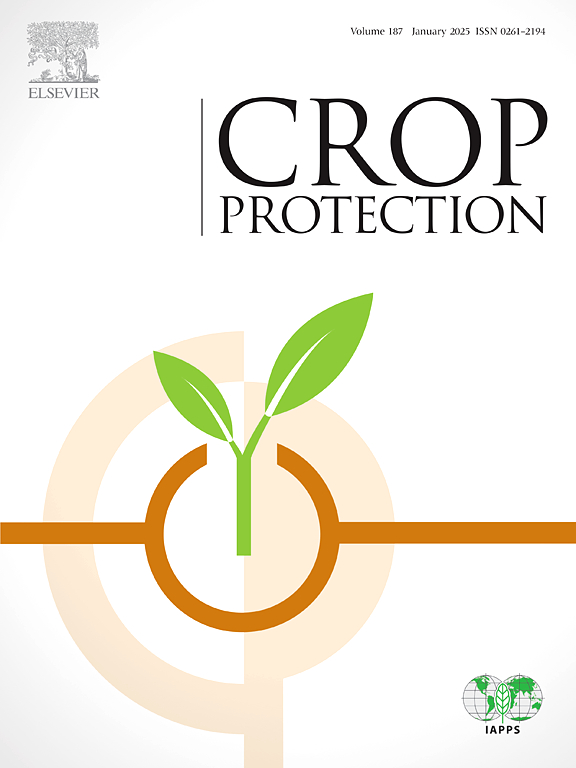Pruning as an effective strategy for the integrated management of fruit and stem canker in dragon fruit production
IF 2.5
2区 农林科学
Q1 AGRONOMY
引用次数: 0
Abstract
Neoscytalidium dimidiatum (Penz.) Crous & Slippers, the causal agent of stem and fruit canker, poses a significant threat to dragon fruit (Selenicereus spp.) production worldwide, potentially causing up to a 60% reduction in fruit market value. This study evaluated the effectiveness of winter pruning to manage this disease in two commercial orchards from mid-October 2022 to July 2023. Stem canker severity (%), fruit canker severity (%), the area under the disease progress curve (AUDPC) of stem canker severity (ss_AUDPC), fruit canker incidence (i_AUDPC), and fruit canker severity (sAUDPC) were determined in pruned plants and non-pruned plants. At both locations, pruned plants consistently showed significantly lower values for stem and fruit severity, ss_AUDPC, i_AUDPC, and s_AUDPC compared to non-pruned plants (P < 0.05). In Orchard 1, fruit canker severity decreased from 2.92% in non-pruned plants to 1.70% in pruned plants. Similarly, in Orchard 2, fruit canker severity declined from 1.80% in non-pruned plants to 0.89% in pruned plants. Winter pruning resulted in up to 61% control of stem canker and 42–51% control of fruit canker. These findings demonstrate that pruning is a critical cultural practice that should be integrated with other preventative strategies to support sustainable dragon fruit production.
求助全文
约1分钟内获得全文
求助全文
来源期刊

Crop Protection
农林科学-农艺学
CiteScore
6.10
自引率
3.60%
发文量
200
审稿时长
29 days
期刊介绍:
The Editors of Crop Protection especially welcome papers describing an interdisciplinary approach showing how different control strategies can be integrated into practical pest management programs, covering high and low input agricultural systems worldwide. Crop Protection particularly emphasizes the practical aspects of control in the field and for protected crops, and includes work which may lead in the near future to more effective control. The journal does not duplicate the many existing excellent biological science journals, which deal mainly with the more fundamental aspects of plant pathology, applied zoology and weed science. Crop Protection covers all practical aspects of pest, disease and weed control, including the following topics:
-Abiotic damage-
Agronomic control methods-
Assessment of pest and disease damage-
Molecular methods for the detection and assessment of pests and diseases-
Biological control-
Biorational pesticides-
Control of animal pests of world crops-
Control of diseases of crop plants caused by microorganisms-
Control of weeds and integrated management-
Economic considerations-
Effects of plant growth regulators-
Environmental benefits of reduced pesticide use-
Environmental effects of pesticides-
Epidemiology of pests and diseases in relation to control-
GM Crops, and genetic engineering applications-
Importance and control of postharvest crop losses-
Integrated control-
Interrelationships and compatibility among different control strategies-
Invasive species as they relate to implications for crop protection-
Pesticide application methods-
Pest management-
Phytobiomes for pest and disease control-
Resistance management-
Sampling and monitoring schemes for diseases, nematodes, pests and weeds.
 求助内容:
求助内容: 应助结果提醒方式:
应助结果提醒方式:


